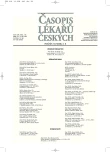Hypokalaemia in a Suicide Attempt of an Adolescent Girl
Authors:
H. Tesfaye; R. Průša; J. Doupovcová
Authors‘ workplace:
Ústav klinické biochemie a patobiochemie 2. LF UK a FNM, Praha
Published in:
Čas. Lék. čes. 2008; 147: 333-336
Category:
Case Report
Overview
In acute theophylline poisoning hypokalaemia, hyperglycaemia, and other electrolyte disturbances may occur. These abnormalities have been attributed to catecholamine excess with intracellular movement of potassium and catecholamine-stimulated gluconeogenesis. Herein we describe a female teenager, who developed metabolic disturbances with significant toxic response to oral theophylline overdose in a suicide attempt. Severe hypokalaemia (1.8 mmol/L) was among the leading pathological findings, at peak theophylline concentration (68 mg/L). There was high plasma glucose (10.2 mmol/L). Creatinine-kinase was evidently abnormal (8.60 μkat/L) several hours post poisoning, while serum myoglobin was markedly elevated (74.8 μg/L) despite the decrease in the drug level. Ventricular arrhythmia with marked extra systoles has been confirmed on electrocardiograph. Finally, the patient recovered through intensive care management with theophylline level (21.1 mg/L) falling close to reference range after 48 hours, but relative hypokalaemia persisted despite potassium supplementations even after the drug level fall below detection limit. In conclusion, timely gastrointestinal decontamination, determination of serum drug levels in intervals, electrocardiography evaluation followed by treatment of arrhythmias, supportive care including balancing of metabolic disturbances, follow-up assessment of serum electrolytes, in particular potassium and creatinine-kinase parallel with myoglobin level assessment even after significant decrease in theophylline level are very important measures.
Key words:
hypokalaemia, theophylline overdose, acute intoxication.
Sources
1. Skinner, M. H.: Adverse reactions and interactions with theophylline. Drug Saf., 1990, 5 s. 275–285.
2. Shannon, M., Lovejoy, F. H. Jr.: Hypokalemia after theophylline intoxication. The effects of acute vs chronic poisoning. Arch. Intern. Med., 1989, 149, s. 2725–2729.
3. Sessler, C. N.: Theophylline toxicity: clinical features of 116 consecutive cases. Am. J. Med., 1990, 88, s. 567–576.
4. Shannon, M.: Life-threatening events after theophylline overdose: a 10 year prospective analysis. Arch. Intern. Med., 1999, 159, s. 989–994.
5. Eshleman, S. H., Shaw, L. M.: Massive theophylline overdose with atypical metabolic abnormalities. Clin. Chem., 1990, 36, s. 398–399.
6. Anderson, W., Youl, B., Mackay, I. R.: Acute theophylline intoxication: Ann. Emerg. Med., 1991, 20, s. 2725–2729.
7. Hagley, M. T., Traeger, S. H., Schuckman, H.: Pronounced metabolit response to modest theophylline overdose. Ann. Pharmacother., 1994, 28, s. 195-196.
8. Shechter, P., Berkenstat, H., Segal, E., Rapoport, J.: Theophylline intoxication: clinical features and pharmacokinetics during treatment with charcoal hemoperfusion. Isr. J. Med. Sci., 1996, 32, s. 766–770.
9. Parr, M. J., Anaes, F. C., Day, A. C. et al.: Theophylline poisoning – a review of 64 cases. Intensive Care Med., 1990, 16, s. 394–398.
10. Bittar, G., Friedman, H. S.: The arrhythmogenicity of theophylline. A multivariate analysis of clinical determinants. Chest., 1991, 99, s. 1415–1420.
11. Sessler, C. N., Cohen, M. D.: Cardiac arrhythmias during theophylline toxicity. A prospective continuous electrocardiographic study. Chest, 1990, 98, s. 672–678.
12. Shannon, M., Lovejoy, F. H. Jr.: Effect of acute versus chronic intoxication on clinical features of theophylline poisoning in children. J. Pediatr., 1992, 121, s. 125–130.
13. Robertson, N. J.: Fatal overdose from a sustained-release theophylline preparation. Ann. Emerg. Med., 1985, 14, s. 154–158.
14. Charytan, D., Jansen, K.: Severe metabolic complications from theophylline intoxication. Nephrology (Carlton), 2003, 8, s. 239–242.
15. Titley, O. G., Williams, N.: Theophylline toxicity causing rhabdomyolysis and acute compartment syndrome. Intensive Care Med., 1992, 18, s. 129–130.
16. Maaten, J. C., Hoorntje, S. J.: Acute renal failure in theophylline poisoning. Neth. J. Med., 1993, 42, s.61–64.
17. Kearney, T. E., Manoguerra, A. S., Curtis, G. P., Ziegler, M. G.: Theophylline toxicity and the beta-adrenergic system. Ann. Intern. Med., 1985, 102, s. 766–769.
Labels
Addictology Allergology and clinical immunology Angiology Audiology Clinical biochemistry Dermatology & STDs Paediatric gastroenterology Paediatric surgery Paediatric cardiology Paediatric neurology Paediatric ENT Paediatric psychiatry Paediatric rheumatology Diabetology Pharmacy Vascular surgery Pain management Dental HygienistArticle was published in
Journal of Czech Physicians

- Advances in the Treatment of Myasthenia Gravis on the Horizon
- Possibilities of Using Metamizole in the Treatment of Acute Primary Headaches
- Metamizole at a Glance and in Practice – Effective Non-Opioid Analgesic for All Ages
- Metamizole vs. Tramadol in Postoperative Analgesia
- Spasmolytic Effect of Metamizole
-
All articles in this issue
- Medical Ethics and Ethicotherapy II
- Metabolic Syndrome and Skin Diseases
- Conduct Disorders in Seven-year-old Children – Results of ELSPAC Study. 2. Risk Factors
- Effect of Growth Factor on the Phenotype of Subpopulations and on the Kinetics of CD34⁺ Cells in the Peripheral Blood and in Grafts of Peripheral Stem Cells in Patients with Non-Hodgkin’s Lymphoma Indicated for Autologous Peripheral Blood Stem Cell Transplantation
- Changes in the Urinary Bladder Caused by Short-term Permanent Catheter Insertion
- Formation of the Urinary Stones in Alkaptonuria Patients
- Hypokalaemia in a Suicide Attempt of an Adolescent Girl
- Journal of Czech Physicians
- Journal archive
- Current issue
- About the journal
Most read in this issue
- Formation of the Urinary Stones in Alkaptonuria Patients
- Changes in the Urinary Bladder Caused by Short-term Permanent Catheter Insertion
- Metabolic Syndrome and Skin Diseases
- Hypokalaemia in a Suicide Attempt of an Adolescent Girl
